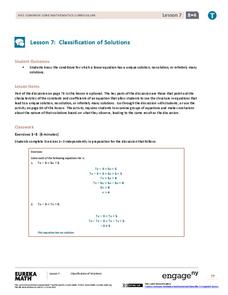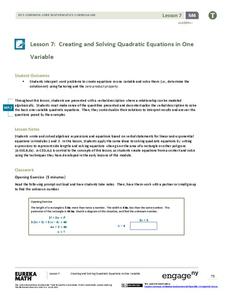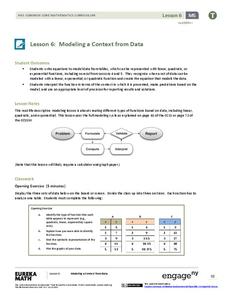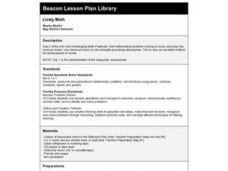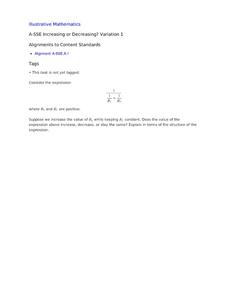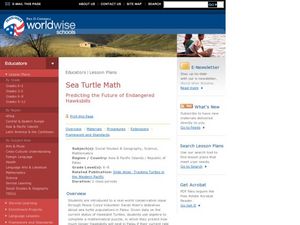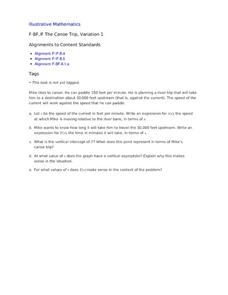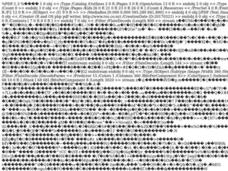EngageNY
Linear Equations in x
What does it mean to solve an equation? The resource revisits the concept of making a linear equation true. Classmates use algebraic methods to transform sides of equations to expressions with fewer terms. They use substitution to...
Illustrative Mathematics
Logistic Growth Model, Abstract Version
Here learners get to flex some serious algebraic muscles through an investigation of logistic growth. The properties of the constant terms in the logistic growth formula are unraveled in a short but content-dense activity. Moving...
EngageNY
Classification of Solutions
Is there one, none, or more? Through discussion or activity, scholars find the properties of an equation that will determine the number of solutions. They then use the properties discovered to figure out the number of solutions for a...
Virginia Department of Education
Balanced
Bring balance to your lesson plans with an activity that asks individuals to solve one-step linear equations with inverse operations. Balance scales help learners understand the concept of isolating the variable.
Curated OER
Using Algebra
Sixth graders explore mathematics by completing equations in a math notebook. They will collaborate in small groups to complete different algebra problems and write their work down in a notebook, which they show their teacher. Then they...
Curated OER
Worksheet #4: Simplify Algebraic Expressions With Two Variables
In this algebraic expression worksheet, students simplify algebraic expressions and solve proportions, and write equations from story problems. Thirteen of the 49 problems are fill in the blank, and the remainder are multiple choice.
EngageNY
The Power of Algebra—Finding Pythagorean Triples
The Pythagorean Theorem makes an appearance yet again in this lesson plan on polynomial identities. Learners prove a method for finding Pythagorean triples by applying the difference of squares identity.
EngageNY
Creating and Solving Quadratic Equations in One Variable
Give your classes practice at modeling using quadratic models with a resource that uses area and integer problems to allow individuals to create second degree polynomials. Young mathematicians solve equations using factoring and then...
Curated OER
Applying Algebra to the Life of Middle Schoolers
Middle schoolers will read word problems, create questions, and come up with solutions. They are taught to use previous knowledge combined with current content to solve problems logically and algebraically.
EngageNY
Graphing Systems of Equations
Expand on learners' understanding of quadratic-linear systems. Building on the graphic understanding developed in the previous instructional activity, pupils learn algebraic methods of solving the systems.
EngageNY
Solving Basic One-Variable Quadratic Equations
Help pupils to determine whether using square roots is the method of choice when solving quadratic equations by presenting a lesson that begins with a dropped object example and asks for a solution. This introduction to solving by square...
EngageNY
Modeling Riverbeds with Polynomials (part 1)
Many things in life take the shape of a polynomial curve. Learners design a polynomial function to model a riverbed. Using different strategies, they find the flow rate through the river.
EngageNY
Modeling a Context from Data (part 1)
While creating models from data, pupils make decisions about precision. Exercises are provided that require linear, quadratic, or exponential models based upon the desired precision.
EngageNY
Modeling with Quadratic Functions (part 1)
Relevance is key! The resource applies quadratic modeling by incorporating application of physics and business. Pupils work through scenarios of projectile motion and revenue/profit relationships. By using the key features of the graph,...
Curated OER
Lively Math
Scholars realize the importance of reading and correct interpretation when engaging in mathematical problem solving. This begins with the understanding of vocabulary and the translation from numeric to algebraic and algebraic to numeric.
Curated OER
Matchstick Math: Using Manipulatives to Model Linear, Quadratic, and Exponential Functions
Playing with matches (unlit, of course) becomes an engaging learning experience in this fun instructional unit. Teach pupils how to apply properties of exponential functions to solve problems. They differentiate between quadratic and...
Curated OER
Review for the Final Exam - College Prep Algebra
In this algebra review worksheet, high schoolers solve 100 open-ended and multiple choice problems. Students factor, simplify, graph, and solve inequalities, expressions, and equations.
Curated OER
Increasing or Decreasing? Variation 1
Your algebra learners analyze the value of an algebraic expression to decide if it will increase, decrease, or stay the same when one variable is changed as the others stay constant. Their collaborative efforts culminate with a written...
Curated OER
Sea Turtle Math
Students consider the future of endangered species. In this conservation lesson, students view a slide show and use mathematical data to construct a prediction for the survival of an endangered species. This lesson includes, personal...
Curated OER
The Canoe Trip, Variation 1
Your river sportsmen will explore an example of paddling upstream as they build functions modeling speed and time in terms of the speed of the current. They then use their algebraic models to interpret features of the function related to...
Curated OER
Beginning Algebra
Sixth graders add algebraic expressions in this beginning lesson. They will solve problems with one common unknown. Then add and multiply as necessary to complete the problems. Basic problems are provided.
Curated OER
Algebra 1: Simplifying Radicals
After discussing the difference between rational and irrational numbers, the class pratices simplifying, adding, and subtracting radical expressions. They play a game which involves passing around cards until they have matching hands of...
Curated OER
Algebra 1
Students study the functional relationships of a variety of problems. In this functional relationship lesson, students determine the dependent and independent quantities of a given set of data. Students record the data and write it in...
EngageNY
Algebraic Expressions—The Distributive Property
Do your classes truly understand the distributive property? Use a demonstrative lesson to represent the distributive property in various ways. Learners solidify understanding by creating a geometric pattern for distributive property, and...




